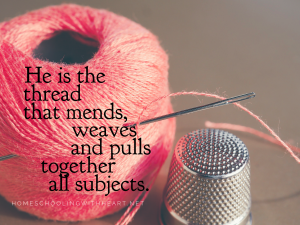
A homeschool parent, i.e. my children’s teacher, main educator, cheerleader, role model, personal chauffeur, finder of lost things, maid, chef (ok I’m using the term chef here loosely), it’s a huge role to fill and at times it can be tough to keep it all together and running smoothly. There are days we don’t finish math or our folder work and that’s ok. One thing I’ve learned on this journey is to expect the unexpected. If you spend hours planning out the perfect lesson, you will spend hours upset and frustrated that it didn’t go as well as you had hoped. But if you spend more time in prayer and in God’s word, that my friends is where true grace and wisdom come flooding in.
Classical Conversations is a huge part of our homeschool journey and success. I have grown closer to God and my children through both homeschooling and CC. I strongly stand behind the classical model of education, and this program has been a huge asset to me. In recently reading Dorothy Sayers speech “The Lost Tools of Learning,” it has opened my eyes to the many failings of modern education. As a homeschool mom I can see where my public education has failed me on so many levels. The thread was cut. God was taken out. But alas, I am reclaiming what has been lost, instilling it into my children’s education and we are learning how to learn together. Wait, what, did she just say? Learning HOW to learn? Huh? I know that’s probably what you are thinking. But read on my friends and I’ll better explain…
In Dorothy Sayers “The Lost Tools of Learning,” she addresses the main problem with modern education in that we, as a society, have lost the tools and knowledge of how to learn. She explains that we send students out into a world without armor or protection. Without this armor, students are susceptible to fall victim to propaganda and hidden agendas. They are also unable to discern fact from opinion. This in and of itself is a huge concern. Students begin to heavily relay on information given to them as fact, rather then check or reference it. This leaves them mislead, unarmed and even unable to argue or stand up for their faith. Not only has modern education lost the tools of learning, but it lacks the connections made between the subjects. Instead, subjects are taught individually. Students cram for a test in one subject, pass it, then never again learn the information or it’s relation to other subjects. Students began to compartmentalize knowledge and subjects, and we start to observe that the student’s way of thinking follows suite. Knowledge is then lost and forgotten. Modern education, as we know it, begins to unravel leaving behind many loose ends.
Problems aside, Sayers offers a solution, or challenge, to mend and reform modern education. To restore what has been lost, she reveals a classical approach that was used long ago in medieval cultures. Where the trivium (in Latin meaning “three roads” or the three stages of development) teaches students the methods of learning. Each stage of learning directly relates to the child’s development, age and way of learning. In the first stage, Grammar, or Poll-Parrot, students ages 11 and under are taught the vocabulary of a subject through observation and memory. Students repeat, sing or chant facts and information. Stage 2, the Dialectic/Logic or Pert stage,(ages 12-14) students are starting to form opinions, argue and ask many questions. Thus debating is often a strong tool used during this stage. Lastly, the third, Poetic or Rhetoric stage of learning, for children ages 16 and up. At this stage, students are ready to express themselves in their learning, and able to start to “teach” on the subjects learned from the previous stages. Once the trivium is complete, students are equipped with tools to learn the mastery of any new subject in half the time and effort of those without these tools. Their well trained minds are now ready and prepared for tackling subjects on their own.
The integration of subjects seen in the trivium is perhaps its greatest tool. Students observe that all subjects relate to one another, and that the tools they have acquired for learning are the same in all subjects as well. Latin is a great example of this. Many will argue that learning a dead language is a useless tool. But as Sayers herself stresses, this is not the case. When a student learns Latin it cuts down the labor of learning any other subject by at least 50%. She states, “It(Latin) is the key to the vocabulary and structure of all the Teutonic languages, as well as to the technical vocabulary of all the sciences and to the literature of the entire Mediterranean civilization, together with all its historical documents.” Not only does Classical Education stress the importance of Latin and the integration of subjects, but students learn that our Lord God is the utmost integral part of learning. After all, he created it! God is seen in all areas and in all stages of learning. He is the thread that mends, weaves and pulls together all subjects. I truly feel that the greatest fall of our modern education system was cutting and pulling him out of it. Proverbs 2:6 reads, “For the Lord gives wisdom; from his mouth come knowledge and understanding.” Through God’s words we gain an understanding that God gives the gift of knowledge. However, the Lord grants knowledge to those who have an honest relationship with him. Don’t cut God out of your kid’s education. Instead seek him first and your children will seek him first.
God Bless
~Courtney

